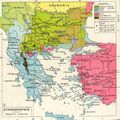Adatok
Nimeni Altul
0 bejegyzést írt és 10 hozzászólása volt az általa látogatott blogokban.

Valós román őstörténet: a vándorlási elmélet.És akkor a végkifejlet. Ha a románok nem a dákok leszármazottai és nem éltek mindig a mai románia területén, akkor kik ők és honnan származnak? Két kiindulási alapunk van: az egyik a román nyelv maga, a másik pedig az írott…..
Nimeni Altul
2019.06.26 18:15:31
@Blogger Géza: hmmm, don't know why, but i can't post my second reply, maybe because i included link?
Nimeni Altul
2019.06.26 19:24:22
@Blogger Géza: Overall, i would say there are things we agree upon, the tihngs we don't see eye to eye is population shifts, identity, ethnic makeup and changes. This is i believe because of old misconception that are now changing day by day. I did asked myself, what happened to all these ancient peoples? why does an area change a kingdom so fast? well, after i learned about the conquest of latin america, after i read about the celts, about the franks and the making of europe, i started to realise some things about language and ethnicty. language and culture can migrate, it can replace autochtonous religion, language culture, but replacing a group of people with another, especialy over a large territory, is far more difficult. we think of the celts as those funny people who dress in kilts or green and sing on bagpipes, but the original celts lived in the alpine mountains of austria, and genetic tests showed the people of wales for example are pretty much unchaged since the early settlers in britain. the celts even had representatives in the iberian peninsula and even turkey. turkish has representatives in asian, semitic, and even european populations. All this taught me, you have to be careful when dealing with questions of ethnicity, culture and language. you gave me some examples on how basque, albanian and other managed to survive, how this language couldn't change or it didn't had enough time, as if there are written dogmatic rules on how language works, but let me tell you, even if an expert in languages would be brought on, i'd still be skeptical, because these questiones seem to have no clear answer and even scholars debate amongst themselves, what do we, simple people know?
some things i forgot to include in my last replies: I do know we are called romanians because of the roman empire, and it's true, the mainstream romanian population isn't aware of it, but can you blame them when even in those times people saw themselves as romans?
i think what is bothering here, is that when romanians united in the 19th century and made a sudden shift towards modernization lots of information came in and lots of it was misinterprated. does nationalism stretches reality? yes it does, but romania is not the sole place where this phenomena happens, and even the occident starts to question its own history, such as, was richard the lionheart french?
Overall, i would say that a large part of balcanic folklore, and i refer here mostly to romanians, bulgarians and serbians, does come from the daco-thracians. it's hard for me to see where do these balcanic peculiarities come from, be it lingusitic, music, clothing etc. So like i said, from this point of view, there is a continuity, not to mention i honestly do not believe at all these ancient people died off, they are the people who contributed the most to the genetic makeshift and the phenotype of balcanic people, so from this point of view also, there is a continuity. In regards to language, we do speak a latin language, and roman settlers were present not only in dacia, but present in the balkans for a very long time as well. some people think that daco-thracian was a language similar to greek, which was somewhat similar to latin, making the ''romanization'' process easier. now, whatever the truth, the conquered daco-thracians did have to speak latin, not only with the administration, but also with people who came in, most notably the slavs, they probably spoke latin to understand eachother, which facilitated the spread of latin, and i imagine places like the market, latin was probably the only language in use. the mix between these peoples gave birth to the new balcanic populations, those who spoke latin as mother tongue gave birth to vlachs, or proto-romanians, and those who spoke slavic gave birth to bulgarians and serbians. And i imagine also there had to be bilingual places, especialy south of danube. But when i think of the ethnogenesis of romanians, serbs and bulgarians, this is what i think of.
Does this ethnogenesis take place in transilvania? no. But like i said in my other replies, i sincerily doubt there was really no presence there, and i find it likely vlachs to be confused with bulgarians or other south slavs, since we had similar clothing, similar tools and weapons, same nobility (jupan, boyar, knyaz, voievode), and same religion and church language. we even had people in panonia, ukraine, poland, and czehia en.wikipedia.org/wiki/Moravian_Wallachia
i find it hard to believe these people could go into those territories from a land where their presence was supposedly barely significant. As far as moldova and wallachia goes, those had to have a romance speaking majority, the theory of the population booms we had is very stretched to be honest, if we were so virile and vigurous people, we should have taken over europe by now.
this is why i believe romanians existed in transilvania.
some things i forgot to include in my last replies: I do know we are called romanians because of the roman empire, and it's true, the mainstream romanian population isn't aware of it, but can you blame them when even in those times people saw themselves as romans?
i think what is bothering here, is that when romanians united in the 19th century and made a sudden shift towards modernization lots of information came in and lots of it was misinterprated. does nationalism stretches reality? yes it does, but romania is not the sole place where this phenomena happens, and even the occident starts to question its own history, such as, was richard the lionheart french?
Overall, i would say that a large part of balcanic folklore, and i refer here mostly to romanians, bulgarians and serbians, does come from the daco-thracians. it's hard for me to see where do these balcanic peculiarities come from, be it lingusitic, music, clothing etc. So like i said, from this point of view, there is a continuity, not to mention i honestly do not believe at all these ancient people died off, they are the people who contributed the most to the genetic makeshift and the phenotype of balcanic people, so from this point of view also, there is a continuity. In regards to language, we do speak a latin language, and roman settlers were present not only in dacia, but present in the balkans for a very long time as well. some people think that daco-thracian was a language similar to greek, which was somewhat similar to latin, making the ''romanization'' process easier. now, whatever the truth, the conquered daco-thracians did have to speak latin, not only with the administration, but also with people who came in, most notably the slavs, they probably spoke latin to understand eachother, which facilitated the spread of latin, and i imagine places like the market, latin was probably the only language in use. the mix between these peoples gave birth to the new balcanic populations, those who spoke latin as mother tongue gave birth to vlachs, or proto-romanians, and those who spoke slavic gave birth to bulgarians and serbians. And i imagine also there had to be bilingual places, especialy south of danube. But when i think of the ethnogenesis of romanians, serbs and bulgarians, this is what i think of.
Does this ethnogenesis take place in transilvania? no. But like i said in my other replies, i sincerily doubt there was really no presence there, and i find it likely vlachs to be confused with bulgarians or other south slavs, since we had similar clothing, similar tools and weapons, same nobility (jupan, boyar, knyaz, voievode), and same religion and church language. we even had people in panonia, ukraine, poland, and czehia en.wikipedia.org/wiki/Moravian_Wallachia
i find it hard to believe these people could go into those territories from a land where their presence was supposedly barely significant. As far as moldova and wallachia goes, those had to have a romance speaking majority, the theory of the population booms we had is very stretched to be honest, if we were so virile and vigurous people, we should have taken over europe by now.
this is why i believe romanians existed in transilvania.
Belépve többet láthatsz. Itt beléphetsz
